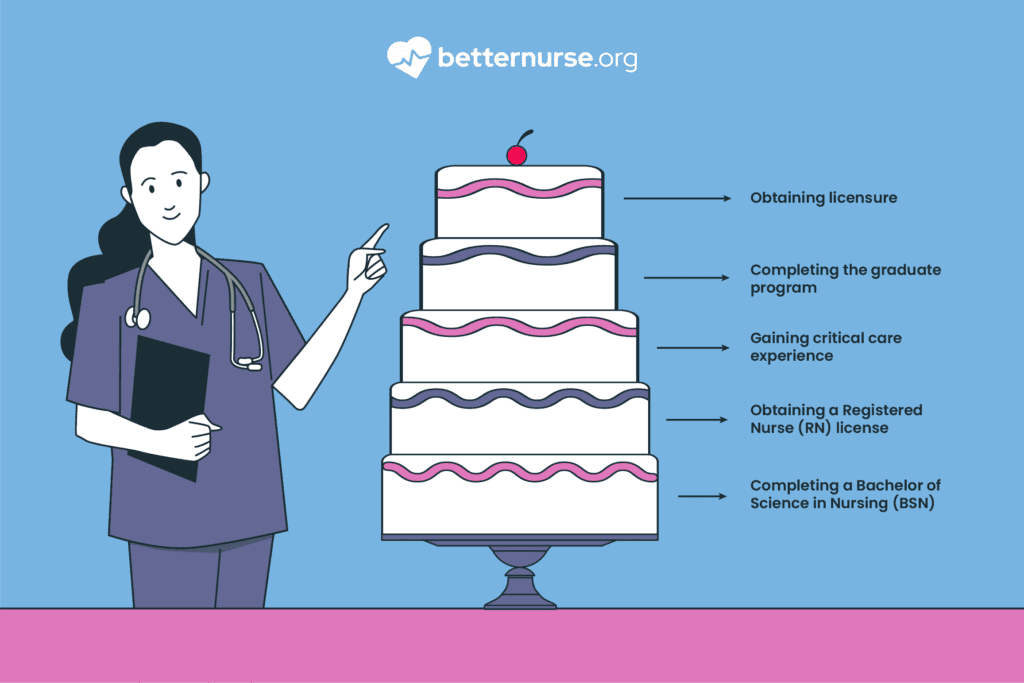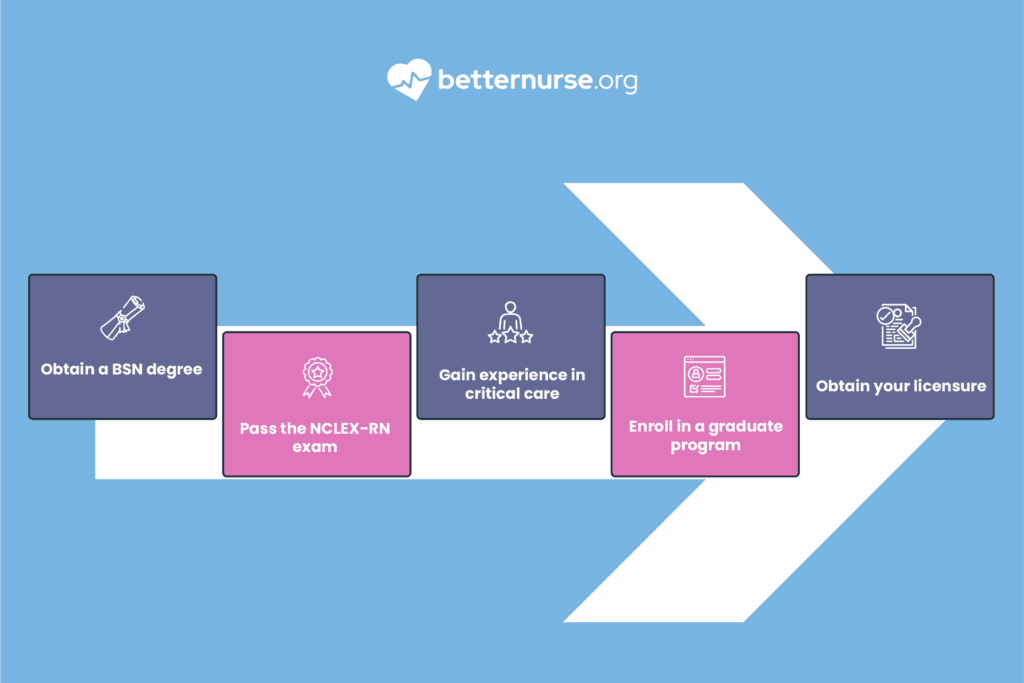A nurse anesthetist is a highly trained and specialized healthcare professional who administers anesthesia to patients undergoing medical procedures and provides post-anesthesia care and pain management.
Understanding how to become a nurse anesthetist
Are you a detail-oriented individual with a passion for healthcare? Do you have what it takes to handle the pressure of administering anesthesia to patients during surgery? If yes, becoming a nurse anesthetist is the right career choice. But how to become a nurse anesthetist? As one of the highest-paying nursing specialties with a high demand for skilled professionals, becoming a nurse anesthetist can be challenging but incredibly rewarding. In this step-by-step guide, we’ll walk you through everything you need to know to kickstart your journey toward this fulfilling career.
Takeway
Becoming a nurse anesthetist is like baking a cake. Many steps are involved, but each is important in creating a delicious dessert or a rewarding career. To begin, you must gather the necessary ingredients: complete a Bachelor of Science in Nursing (BSN) degree and obtain a Registered Nurse (RN) license. Next, you mix these ingredients by gaining critical care experience. You put the batter in the oven by completing a graduate program. Finally, just like a cake needs frosting, you must obtain licensure to provide excellent patient care.

What Is a Nurse Anesthetist?
A nurse anesthetist is a healthcare professional specialized in administering anesthesia to patients. They work alongside anesthesiologists and other medical professionals to ensure anesthesia’s safe and effective delivery during surgical procedures.
Nurse anesthetists are registered nurses with additional training in anesthesia and related fields, and they play a critical role in ensuring patient comfort and safety during surgery.
They are responsible for monitoring vital signs, adjusting anesthesia levels as needed, and supporting patients before, during, and after surgery.
Steps to Becoming a Nurse Anesthetist

Becoming a nurse anesthetist is a thrilling and demanding career requiring commitment and effort. If you have a strong interest in healthcare, thrive in a fast-paced setting, and genuinely desire to help people, then pursuing a career as a nurse anesthetist could be an ideal option. The guide below will walk you through the necessary steps to become a nurse anesthetist and give you an idea of what it takes to succeed in this field.
Obtain a BSN degree
If you dream of a nurse anesthetist career, the first step is exciting—earning a Bachelor of Science in Nursing (BSN) degree! Although the BSN program usually takes years, there are ways to complete it faster if you already have a nursing diploma or associate degree. During the program, you’ll gain a deep understanding of nursing fundamentals, such as patient care, pharmacology, and leadership skills. And the best part is that you don’t have to put your life on hold, as some nursing schools offer flexible online or hybrid programs. Once you complete your BSN, you’ll be well-prepared to take a master’s degree in nursing and pursue the advanced practice certification needed to become a nurse anesthetist.
Pass the NCLEX-RN exam
The next step includes passing the National Council Licensure Examination for RNs (NCLEX-RN). This computerized test evaluates a wide range of knowledge and skills related to nursing practice, healthcare systems, patient care, communication, and education. The NCLEX-RN is designed to be adaptive, meaning that the difficulty level of questions increases as the candidate’s performance improves.
Gain experience in critical care
Gaining experience in critical care is necessary for becoming a nurse anesthetist because it provides a strong foundation for assessing and managing critically ill patients, a crucial aspect of anesthesia practice.
Working in critical care helps you develop skills in monitoring vital signs, managing airways, and administering medications that will directly apply to your role as a nurse anesthetist.
Additionally, working in critical care will expose you to various medical conditions and procedures, which will help you become a well-rounded healthcare provider and enable you to make informed decisions when providing anesthesia to your patients.
Enroll in a graduate program
Enrolling in a graduate program to become a nurse anesthetist is a necessary step, and it provides many advantages and possibilities. Enrolling in a graduate program opens up a path to a fulfilling and financially rewarding career in healthcare.
Moreover, pursuing a graduate program in this field will provide you with comprehensive and specialized training in the principles and practices of anesthesia. This will equip you with the knowledge and skills to safely and effectively administer anesthesia. Such knowledge is vital to providing quality healthcare.
Finally, enrolling in a graduate program allows you to gain access to clinical experiences and hands-on training. Such experiences and training are essential in building the practical skills and confidence necessary to work in this field.
Obtain your licensure
Finally, obtaining licensure to become a nurse anesthetist will be one step toward your career. It is a legal requirement in most parts of the United States. Securing licensure demonstrates to employers and patients that you have met the rigorous educational and clinical requirements to provide safe and effective anesthesia care. Additionally, it may open up more job opportunities and potentially lead to higher salaries. Finally, licensure ensures that you are held accountable to a professional code of ethics and standards of practice, ultimately leading to better patient outcomes and the protection of public health.
Nurse Anesthetist Education
Becoming a nurse anesthetist is an exciting and challenging career path that requires dedication and hard work. As previously mentioned, it all starts with earning a BSN degree, where you learn about basic nursing concepts. However, it doesn’t stop here. Read on to learn more about education requirements that you can take to hone your skills and knowledge.
BSN
Becoming a nurse anesthetist requires advanced education and specialized training. The first step, earning a BSN degree, typically takes four years to complete. During this time, you will learn about basic nursing concepts, pharmacology, and patient care. You will also gain practical experience through clinical rotations in various healthcare settings. A BSN degree is a requirement for advanced nursing programs, such as a Doctor of Nursing Practice (DNP) degree.
DNP
After completing a BSN degree, aspiring nurse anesthetists can pursue a DNP degree. This program typically takes three to four years to complete and provides you with an in-depth understanding of advanced nursing concepts, healthcare leadership, and evidence-based practice. DNP programs also include specialized coursework in anesthesia and pain management and clinical rotations in hospitals and other healthcare facilities. Upon completing a DNP degree, you can take the certification exam to become a Certified Registered Nurse Anesthetist (CRNA).
How Long Does It Take To Become a CRNA?

Becoming a Certified Registered Nurse Anesthetist (CRNA) requires at least seven years of education and training. It includes earning a BSN, obtaining an RN license, gaining at least one year of critical care nursing experience, and completing a master’s or doctoral degree in nurse anesthesia. The master’s or doctoral program can take 2-3 years to complete, and upon graduation, individuals must pass the National Certification Examination to become a CRNA. That said, becoming a CRNA can take around 7-8 years, depending on the individual’s educational and professional background.
Is Becoming a CRNA Worth It?
Becoming a certified registered nurse anesthetist is considered worthwhile due to the high salary and demand. With nurse anesthetist salaries frequently exceeding six figures and a higher degree of autonomy than some nursing roles, CRNAs enjoy financial rewards and professional fulfillment.
However, the role’s rigorous education, training, and responsibility demand dedication. Aspiring CRNAs should carefully evaluate their passion for anesthesia, commitment to ongoing learning, and ability to handle high-stress situations before embarking on this rewarding yet demanding career path.
Conclusion
In conclusion, becoming a nurse anesthetist can be a challenging but rewarding career path. With dedication and hard work, anyone can achieve this goal. Becoming a nurse anesthetist requires completing a rigorous educational program, gaining practical experience, and obtaining the necessary certifications and licenses. However, the benefits of this career, such as the opportunity to help people during critical moments in their lives and the potential for a high salary, make the effort worth it.

Nurse Luke is a CRNA who specializes in Nursing content and still enjoys a very busy career with Locum, Per Diem and Travel nursing in the greater midwest. He has over 25 years of experience in the healthcare field and received his CRNA masters degree from the Mayo Clinic School of Healthcare. He is passionate about helping nurses explore the options of becoming a travel nurse as well as spending time with his Family.



